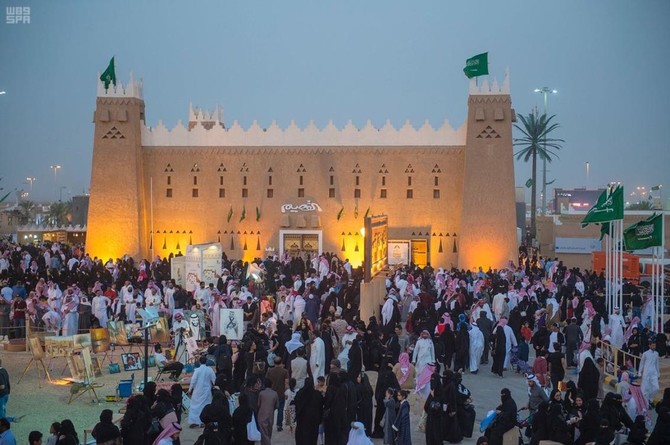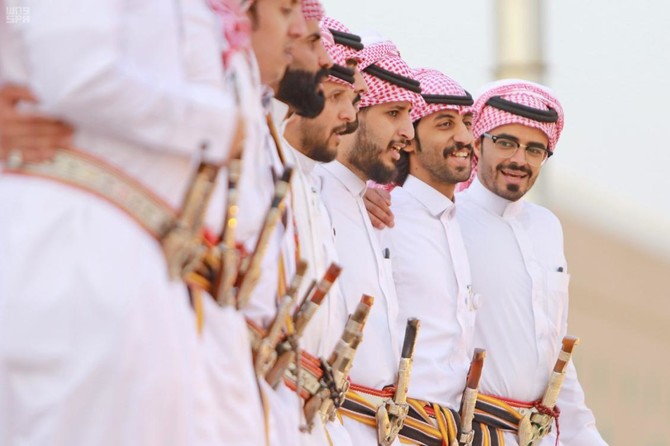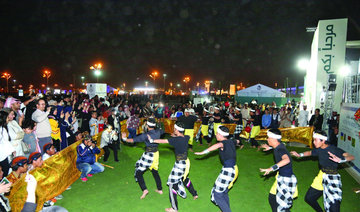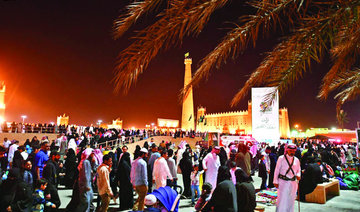RIYADH: Janadriyah, the annual national heritage and culture festival named after the village on the northern outskirts of Riyadh, is busy celebrating the Saudi lifestyle as well as symbols of its identity, unity and integrity. The festival also offers a balanced view and a flashback to Saudi Arabia’s rich heritage.
India is the guest of honor country this year. The annual heritage festival, which runs for 18 days, will conclude on Feb. 24.
Every year the festival attracts a remarkable turnout of local and expatriate visitors, including school children and families, as well as visitors from outside the Kingdom.
This year the festival has launched a free application for smartphones, called “Janadriyah,” to guide visitors around the event and keep them updated on entertainment and cultural programs.
Nazaha participates in Janadriyah festival
The National Anti-Corruption Commission (Nazaha) is partaking in the 32nd Janadriyah National Heritage and Culture Festival for the sixth consecutive year.
Specialists in integrity protection and anti-corruption programs, as well as in public relations and media, are present at Nazaha’s pavilion to answer visitors’ inquiries and receive their feedback.
Through its participation, Nazaha aims to introduce the public to efforts exerted to combat corruption in the Kingdom.
The pavilion features signboards about programs, initiatives, events, studies, workshops, conferences and research implemented by Nazaha regarding integrity protection and fighting corruption.
The pavilion also contains screens with videos games, and a drawing workshop with coloring books for children.
Big turnout for UAE pavilion
The UAE pavilion at the festival is impressing visitors with 45 different cultural events and folk shows reflecting the history of the Emirates.
The pavilion has seen a big turnout by visitors, who are received with drums and folk songs. Visitors are invited to take part in folk dances to learn more about Emirati cultural and musical heritage dating back hundreds of years.
The pavilion also features a collection of UAE cultural films that shed light on special elements of the country such as traditional architecture. Generous Arab hospitality is represented in a corner that offers Emirati-made coffee as well as live shows depicting how it was made.
The popular souk at the UAE pavilion, which offers Emirati-made products, is introducing a new generation to the material heritage and culture of UAE’s different towns and environments. The souk celebrates the rich and diversified heritage of the people and its rich and ancient roots.
Three photographic exhibitions portray important historical events.
The first one focuses on the traditionally strong Saudi-Emirati relations. The second exhibition is a collection of cultural photographs of UAE’s renaissance under the rule of the late Sheikh Zayed bin Sultan Al-Nahyan. The third exhibition is about tourism, with images of the best sites for visitors to experience the UAE.
The pavilion is made entirely of traditional natural heritage materials, featuring mud architecture for 80 percent of the design, over an area of 6,500 square meters. The design aims to embody UAE’s authentic heritage and its close connection with the local environment, and the country’s commitment to sustainability, including heritage items and traditional arts.
Janadriyah festival attracts thousands of local, foreign visitors
Janadriyah festival attracts thousands of local, foreign visitors

Umrah guests praise Kingdom’s rich heritage

- Sheikh Khadem Mbaki, a preacher from Senegal, expressed his joy at witnessing Madinah’s rich cultural and historical heritage
- Ali Coulibaly from Mali said that the Kingdom is a global religious and cultural destination
RIYADH: Guests of the Custodian of the Two Holy Mosques Program for Umrah and Visit praised Saudi Arabia’s development and progress across various fields.
They commended efforts to preserve religious sites and historical monuments, highlighting a rich cultural heritage spanning thousands of years, the Saudi Press Agency reported.
During their tour of religious sites and monuments in Madinah, part of a program organized by the Ministry of Islamic Affairs, they expressed gratitude to the Kingdom for hosting them.
Sheikh Khadem Mbaki, a preacher from Senegal, expressed his joy at witnessing Madinah’s rich cultural and historical heritage.
He highlighted how the sites reflect various aspects of Islamic civilization, and praised the Kingdom’s dedication to preserving these important landmarks.
Mbaki also acknowledged the Kingdom’s efforts to ensure the well-being of visitors and Umrah performers from around the world.
Ali Coulibaly from Mali said that the Kingdom is a global religious and cultural destination due to its many historical monuments and archaeological sites in regions like AlUla and NEOM.
He also noted the rapid development of infrastructure projects, which enhance the Kingdom’s ability to welcome tourists and visitors and provide year-round access to these historical and cultural sites.
Mohammed Abdo Abu Yaali from Morocco praised the cultural and historical richness he experienced during his visit to Madinah’s historical sites.
He appreciated the in-depth explanations about the significance of these sites as well as their connection to Islamic history and the life of the Prophet.
Amin Baddad from Algeria expressed his heartfelt thanks to the Saudi leadership for hosting him to visit Madinah and perform Umrah.
He shared the beautiful memories created during his visit and prayed to Allah to reward those responsible for the program for their efforts.
Saudi FM holds phone call with Malaysian counterpart

RIYADH: Saudi Foreign Minister Prince Faisal bin Farhan held a phone call on Monday with his Malaysian counterpart, Dato’ Seri Utama Haji Mohamad bin Haji Hasan.
During the call, the chief diplomats discussed relations between Riyadh and Kuala Lumpur, the Saudi Press Agency reported.
Outgoing US ambassador praises transformation in Saudi Arabia

- Ambassadors from the US, Egypt and Oman bid farewell to the Kingdom
- Dean of the diplomatic corps hosts farewell ceremony for outgoing envoys
RIYADH: The dean of the diplomatic corps accredited to Saudi Arabia, Dya-Eddine Said Bamakhrama, hosted a farewell ceremony for outgoing ambassadors of the United States, Egypt and Oman at the Cultural Palace in Riyadh on Monday.
“We have gathered here for ambassador of Egypt, Ahmed Farouk, ambassador of Oman, Sayyid Faisal bin Turki, and the US ambassador Michael Ratney. The meeting marks the conclusion of their tenure as ambassador to Saudi Arabia. We have them here representing three continents, Africa, Asia and America,” Bamakhrama said in his opening remarks.
“All of them were very close to me and to many of our colleagues. Ambassador Farouk was here for more than five years, which is extraordinary for an Egyptian ambassador. Sayyid Faisal was my neighbor in the DQ (diplomatic quarter) and we had a great time. Michael has been here for two years. I wish them all the very best in their future endeavors. We will miss you, and wishing you all the best,” said Bamakhrama, who is also Djibouti’s ambassador in Riyadh.
On behalf of the diplomatic corps Bamakhrama presented souvenirs to the outgoing ambassadors.
At the same event he introduced new ambassadors in Riyadh from Romania, Serbia, Sierra Leone, Bangladesh, Sri Lanka, Nepal, Syria, Palestine, Peru and Uruguay.
Ratney, in his farewell speech, said: “I wish I were staying in this country longer. It’s been, for me, an amazing experience to have a front row seat for what’s going on in Saudi Arabia, the amazing transformations of this country. And to have played even a small part in strengthening the relationship between Saudi Arabia and my country was an honor.
“Saudi Arabia is a country of tribes,” he said. “I feel like you are my tribe. Every time I walk in this room or one of your homes or an event, I feel like I am home. And I tell you, when I got to the country and started meeting the diplomats, I remarked that the quality of diplomats that all of your governments were sending to Saudi Arabia was extraordinary. And I thought, I need to step up my game. You all gave me a standard to try to meet, and it’s been just an extraordinary pleasure every time I am with you. I will miss all of you. I hope this is the end of my 34-year diplomatic career, and it’s time to move on.”
Farouk at the gathering said: “Thank you all for convening all our distinguished colleagues here. I have mixed feelings after 40 years of diplomacy since 1985. This is the end of my diplomatic career, and I believe that life has to come to a crossroads sometime.”
On a lighter note he added that sometimes there is a chance to make a U-turn and come back.
“I am glad, and I feel that I have achieved something for my country in Saudi Arabia,” he said. “I wish you all the best and wish the very best in your future endeavors, we will be in touch.”
Bin Turki said: “Just like my colleagues, I think, I definitely have mixed feelings. As a non-diplomat, I joined the ministry of foreign affairs in 2017. I never thought I would be appointed as an ambassador, but I ended up being an ambassador. And the first thing I had in mind when I came here, I said I wish they would give ambassadors a manual, the do’s and don’ts, but it doesn’t happen.
“For someone who is not coming from that background it’s quite a challenge. And the first thing I told my team when I walked into the embassy, I said, I have two options: I either become a classic ambassador, or someone who thinks out of the box. And I said, you will be teaching me everything that you are good at as diplomats, and I will be sharing with you everything that I know as a non-diplomat. And now I am the new diplomat. And it has been an extraordinary journey in this country, an amazing place. Four years, and it feels like yesterday.
“I keep telling people about the amazing things that are happening in Saudi Arabia and the amazing people that I meet every day. It’s a journey and I would like to thank everyone, the dean of diplomatic corps, all of you extraordinary people. I learned a lot and back home, I would love to share those stories, whether it’s with family and others as well.”
Saudi commission’s deep dive to protect Red Sea heritage sites

- Second phase builds on a series of national initiatives to preserve the Kingdom’s diverse cultural heritage
- Includes developing a sustainable approach to conserving underwater heritage, with a focus on sites spanning the governorates of Jeddah and Al-Qunfudhah
RIYADH: Saudi Arabia’s Heritage Commission has launched the second phase of a project focused on studying underwater cultural heritage sites along the Red Sea coast.
In partnership with King Abdulaziz University and the University of Naples L’Orientale in Italy, the second phase builds on a series of national initiatives to preserve the Kingdom’s diverse cultural heritage.
This includes developing a sustainable approach to conserving underwater heritage, with a focus on sites spanning the governorates of Jeddah and Al-Qunfudhah, the Saudi Press Agency reported on Monday.
International partners of the initiative include the Alexandria Center for Maritime Archaeology and Underwater Cultural Heritage, the National Research Institute of Maritime Cultural Heritage in South Korea, and the University of Cape Town in South Africa.
The project seeks to provide accurate information for the management and protection of these sites, and expand research and scientific studies related to them. The ultimate goal is to enhance knowledge and documentation of this cultural heritage, SPA reported.
Expected outcomes include comprehensive reports analyzing archaeological findings, a developed management plan, and detailed scientific documentation of submerged heritage elements.
These will contribute to the national archaeological registry and enhance the national protection of underwater cultural heritage along the Red Sea coast, SPA reported.
This project will also highlight the historical and cultural connections between Saudi Arabia and other countries, as the Red Sea coast is a major historical maritime route.
The Kingdom has made significant efforts in this field, which aligns with the UNESCO Underwater Cultural Heritage 2001 Convention. These include establishing a dedicated center for underwater cultural heritage, a key initiative within Vision 2030 aimed at achieving sustainable development in the field of national heritage.
Saudi aid provides relief to thousands in Syria, Gaza

- Ongoing support offers food, shelter and medical supplies to those affected by conflict
RIYADH: Saudi aid agency KSrelief has continued to provide aid to the people of Syria as part of various humanitarian missions.
On Monday, a relief plane — the 14th so far — arrived in Damascus from Riyadh, carrying food, shelter and medical supplies for those facing challenging conditions, reported the Saudi Press Agency.
In Harasta town, Rural Damascus governorate, KSrelief distributed 399 bags of flour, blankets and personal care kits, benefiting 532 people.
The Saudi aid agency also distributed shopping vouchers to 56 beneficiaries in Jindires town, Aleppo governorate, enabling them to purchase winter clothing from designated stores.
In Talbiseh town, Homs governorate, KSrelief distributed 327 food baskets, winter kits and personal care kits for 529 people.
These efforts, in coordination with the Syrian Arab Red Crescent, are part of Saudi Arabia’s commitment to alleviating the suffering of the Syrian people.
According to KSrelief, Saudi Arabia’s total aid to Syria from 2011 to the end of 2024 exceeds $856 million.
Meanwhile, in the northern Gaza Strip, the Saudi aid agency is providing support to returning residents in Jabalia.
KSrelief’s executive partner in Gaza, the Saudi Center for Culture and Heritage, has provided essential items such as blankets, mattresses, cooking utensils and more to help families who lost everything due to the widespread destruction.
Since its launch in 2015, KSrelief has implemented 3,306 projects worth almost $7.3 billion in 105 countries, in partnership with 461 local, regional and international organizations.
Its programs include food security, water sanitation, health, education, emergency aid, nutrition, protection, early recovery and telecommunications.






















